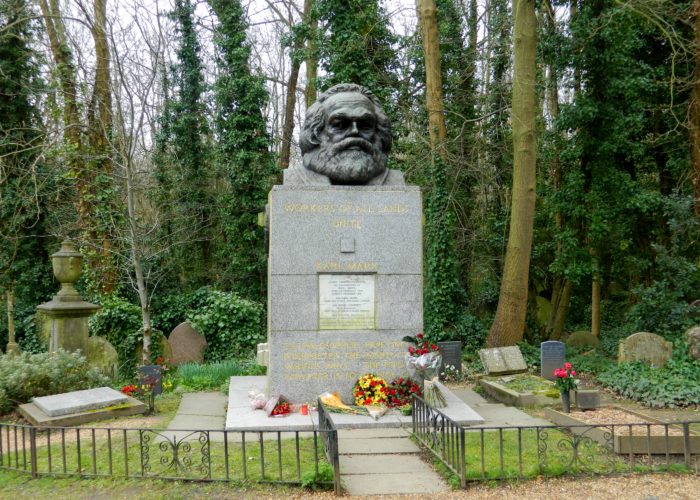Karl Marx’s headstone
Karl Marx is regarded by many as one of the greatest of political thinkers and one of the most influential voices of modern times. His famous work written with Friedrich Engels, The Communist Manifesto, was a call to arms to the oppressed of the world and forms the basis for the modern communist movement that exists today.
Karl Marx (1818-1883) was born into a prosperous middle-class family in Germany. As his thinking became increasingly radical, he established himself as a journalist in Cologne but attracted the unwanted attention of the censors and in 1843 was forced to leave. Marx moved to Paris where he met the man who would become his lifelong friend and collaborator, Friedrich Engels. Despite his comfortable background, Engels was an ardent socialist and believed in the need for social revolution.
This was a time of enormous industrial and social change, with Britain at the forefront. Newly industrialised cities were expanding as thousands of people moved from the countryside to find work. Economic growth and success depended on this workforce, yet the majority of workers lived in abject poverty while their employers grew wealthy. Against this backdrop and under Engels’ influence, Marx began to develop ideas which would become known as Marxism. Marx proposed that all historical progress had originated in class struggle, whereby people competed over property and labour. He described the situation in the 1800s as a struggle between the bourgeoisie (the ruling class) and the proletariat (the working class). The class-consciousness of the proletariat needed to be fostered if the situation was to change.
In 1848 Marx and Engels published their most famous work, The Communist Manifesto. It argued that capitalism would inevitably self-destruct and be replaced by socialism and ultimately communism. It is here that Marx wrote the phrase ‘Proletarier aller Länder vereinigt Euch!’, translated as the now famous political rallying cry ‘Workers of the world unite!’, which would be adopted by the Communist League, and later by East Germany, as its official motto.
Marx eventually moved to Britain where he died in 1883. He is buried in Highgate cemetery in London – along with many other notable figures including famous contemporaries such as Michael Faraday and George Eliot (Mary Ann Cross) and, more recently, political activist Claudia Jones, writer Douglas Adams and singer George Michael. The headstone was sculpted by Laurence Bradshaw and is inscribed with a translation of his famous phrase ‘Workers of all lands unite’.
Did you know..?
Karl Marx’s tomb is a ‘Grade I listed’ monument – the highest protection reserved for buildings and structures of ‘exceptional interest’.
Sources & acknowledgements
This object description and its related educational resources were researched and written by our team of historians and education specialists. For further information see the item’s home museum, gallery or archive, listed above.
-
Did you know..?
Karl Marx’s tomb is a ‘Grade I listed’ monument – the highest protection reserved for buildings and structures of ‘exceptional interest’.
-
Education overview
You can access a range of teachers resources related to this object and more on our education page.
Please also see our glossary of terms for more detailed explanations of the terms used.
-
Curatorial info
- Originating Museum: Highgate Cemetary
- Production Date: 1956
- Creator: Laurence Bradshaw
- Original record
-
Use this image
You can download this image for personal and educational use but please take note of the license type below.
- Rights Holder: Paasikivi
- License Type:



